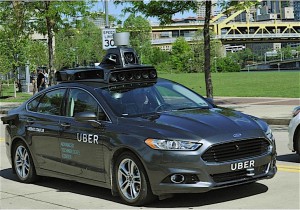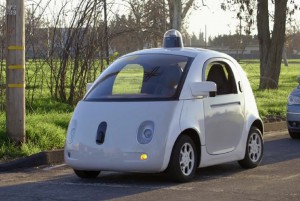
Uber has already started testing autonomous vehicles with an eye toward using them in their regular ride-sharing fleet someday.
During the next two decades, autonomous vehicles will grow into $560 billion industry, according to a new report from a prominent consulting firm.
AT Kearney interviewed 150 executives from the automotive, tech and communications industry in preparing the study, which estimates that it will take up to two decades for fully autonomous driving to emerge.
“While industry players have already developed or tested many of the technological building blocks, tough and tricky legal challenges remain, including new laws on accident liability, on where self-driving cars may operate, and on who may have a license,” the comprehensive study noted.
“Also, new traffic guidelines have to be developed for autopilot and for fully autonomous driving. The incentives to establish the right legal framework are high, and executives in our study are confident this framework will develop, probably with California as the pioneer.”
(Mercedes pulls controversial commercial touting E-Class autonomous capability. For more, Click Here.)
But the impetus is enormous. Autonomous driving will produce enormous savings by reducing accidents by 70%, according to the Kearney estimates. In addition, autonomous vehicles will save fuel, increase productivity and ease congestion on overcrowded highways, producing enormous savings.

Google continues to expand its ongoing testing program for self-driving vehicles and its recognition as the leading autonomous vehicle company in the U.S.
During the next 20 years, autonomous driving will be the culmination of decades of research and development by many companies around the world, not just the brainstorm of a few disruptive newcomers. This point comes across early in our study as we interviewed executives from the traditional OEMs, telecom services and infrastructure providers, and the large network of suppliers that supports them.
“Premium OEMs will develop their own intelligent cars,” the chief strategy officer at a major OEM told us. Daimler’s self-driving concept car has four swiveling lounge chairs that allow face-to-face conversations when the car is in automatic mode.” the study said.
Another executive interviewed by Kearney suggested that car maker might want to create dedicated academies to help train consumers to become comfortable with self-driving vehicles.
(Click Here for more about Toyota teaming with the University of Michigan.)
The companies on the “connected” side of connected mobility are no less ambitious. “We believe that we will achieve a 10 percent share of the mobility market with drones and commuter vehicles,” a C-level executive at an Internet media company told us. Another executive remarked that “drones will be accepted by people who are not able to drive,” the study noted.
Not every car maker will benefit of from the emergence of the $560 billion autonomous car business. The wake-up call for the automotive industry is that not all incumbent (manufacturers) will get a piece of the market.
“Manufacturers face hard questions as they jockey for position — from thinking about their value propositions, which core capabilities they need, and which players they should partner with, to developing business models that offer the best go-to-market strategies and the best chances to win,” the study said.
(To see more about the latest Tesla Autopilot crash, Click Here.)
“These decisions are high-stake and urgent,” the study noted.
